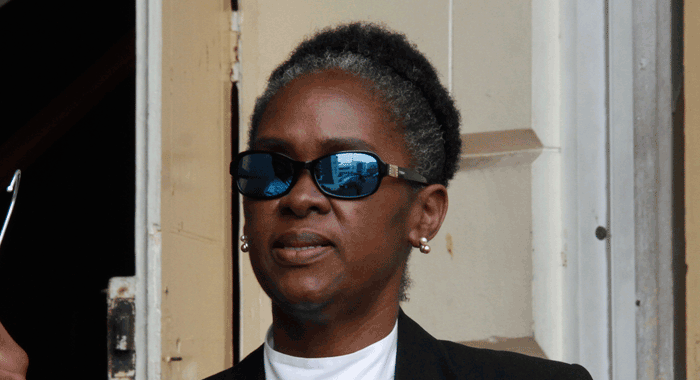High Court judge Justice Esco Henry will next Tuesday, Feb. 27, hand down her decision on an application by lawyers for the election petitioners to inspect ballots and counterfoils used in the 2015 election in Central Leeward.
The main opposition New Democratic Party (NDP) has filed two petitions challenging the outcome of the vote in Central Leeward and North Windward, respectively.
Lawyers for Ben Exeter, the NDP candidate in Central Leeward in the 2015 elections, are asking the court to allow their client to inspect the election documents used in that district.
Exeter’s case is essentially that all ballots were designed contrary to how the election rules prescribed.
The NDP’s legal team is arguing that as a result of an alleged flawed design, the presiding officer handled the ballots improperly, and invalidated them by omitting to endorse the official mark and/or by the official mark appearing on them in such a manner that over 90 per cent of the ballot could not be folded so that the initials of the presiding officer and the official mark can be seen without opening them, as required under the Rules.
They say that consequently, numerous voters were thereby disenfranchised.
The NDP’s legal team further claims that the returning officer, Winston Gaymes, counted all these “invalid ballots” at the final count — against Exeter and his representatives’ objections.
The NDP’s legal team says that the Organization of American States’ report on the election confirms this and that Gaymes swears under oath he counted the ballots despite his knowledge that all the ballots cast at polling station CLF were invalid pursuant to the rules.
These ballots, which Exeter describes as mutilated from their odd appearance, were also counted in the final count.
In October 2017, the NDP’s legal team rejected a draft consent order after the respondents insisted that the petitioners be allowed to inspect only the ballot boxes used in Central Leeward.
During hearing on Dec. 12 and 13, lawyers for the respondents tried to convince the court that in some instances, the petitioners have no evidence of wrongdoing and are, therefore, on a fishing expedition.
Senior Counsel Douglas Mendes, the lead lawyer for the government in the matter, made that case as he tried to convince the High Court that it should not grant petitioner Exeter’s request to inspect the document.
The respondents’ legal team tried to convince the court that the efforts of the petitioner to inspect some of the ballot boxes amount to a fishing expedition since, on the face of it, there is no evidence of anything untoward having occurred.
They advanced this argument to the court even as they tried to work around Supervisor of Elections Sylvia Findlay Scrubb’s Dec. 21, 2015 affidavit, in which she suggested that ballots were pre-printed with the official mark — contrary to law — a statement she later withdrew, saying she had made a mistake.
Mendes, who is representing Findlay-Scrubb in the matter, noted that all parties are agreed that the ballots in one polling station were defective, as reflected by the presiding officer, Winston Gaymes, in his affidavit.
The lawyer, however, said that while the petitioners have pleaded that all the ballots were pre-printed with the official stamp and, in some instances, the official mark was printed on the counterfoil, the only evidence they have presented to substantiate this is Findlay-Scrubb’s affidavit.
After the petitions were filed, Findlay-Scrubb wrote to her lawyers saying she had made a mistake.
“The ballots were not printed with the official mark prior to the conduct of the election as I initially suggested. There was no official mark printed on the ballots delivered to the Presiding Officers by me for the conduct of the General Election,” she said.
But the respondents have another legal hurdle over which to climb: the evidence of the presiding officer, Winston Gaymes.
In an affidavit sworn in opposition to the December 2015 motion to inspect the ballot boxes, Gaymes said:
“The facts are as follows; when I opened the box CLF,1 I discovered that the ballots in this specific box did not have the initials of the presiding officer nor any initial mark on the ballots. As a result, I stated that I was minded to reject all the votes in this specific box.”
But the Supervisor of Elections attempted an explanation of this admission in her sworn statement, and concluded by imploring that:
Election officials say that the Unity Labour Party of Ralph Gonsalves won the vote by taking eight of the 15 parliamentary seats for a repeat of the December 2010 general election results and a fourth consecutive term in office.







By the time a final decision is made it will be 2020 and new elections, if the case don’t get thrown out before….. Such a waste of time and money
A1 Al it is never a waste of time or effort to expose dirty politics and dirty politicians.
Keep in mind, if the learned judge rules in favour of the petitioner and the PM then tries to dissolve the House and call a new general election, the Governor General has the constitutional right to refuse the PM’s request. For example, he could implore the PM to simply call a single by-election in Central Leeward.
You may be right for more reasons than that. At this juncture DREGSs would be foolish to risk losing many seats to that of losing one and becoming a major minority party instead of a minor minority one.
A woman judge! That is good! It seems the women in Saint Vincent are more likely to have the courage to uphold the law, no matter what, then male Magistrates.